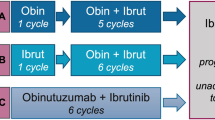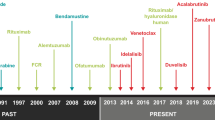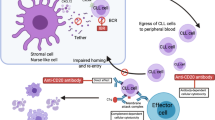Abstract
Bruton tyrosine kinase (BTK) inhibition is an effective therapy for many B-cell malignancies. Acalabrutinib is a next-generation, potent, highly selective, covalent BTK inhibitor. To characterize acalabrutinib tolerability, we pooled safety data from 1040 patients with mature B-cell malignancies treated with acalabrutinib monotherapy in nine clinical studies (treatment-naïve: n = 366 [35%], relapsed/refractory: n = 674 [65%]; median [range] age: 67 [32–90] years; median [range] prior treatments: 1 [0–13]; median [range] duration of exposure: 24.6 [0.0–58.5] months). The most common adverse events (AEs) were headache (38%), diarrhea (37%), upper respiratory tract infection (22%), contusion (22%), nausea (22%), fatigue (21%), and cough (21%). Serious AEs (SAEs) occurred in 39% of patients; pneumonia (6%) was the only SAE that occurred in ≥2%. Deaths due to AEs occurred in 52 patients (5%); pneumonia (n = 8) was the only fatal AE to occur in ≥3 patients. AEs led to treatment discontinuation in 9%. Rates for the AEs of interest (all grades) included infections (67%), hemorrhages (46%), neutropenia (16%), anemia (14%), second primary malignancies (12%), thrombocytopenia (9%), hypertension (8%), and atrial fibrillation (4%). This pooled analysis confirmed acalabrutinib’s tolerability and identified no newly emerging late toxicities, supporting acalabrutinib as a long-term treatment for patients with mature B-cell malignancies.
This is a preview of subscription content, access via your institution
Access options
Subscribe to this journal
Receive 12 print issues and online access
$259.00 per year
only $21.58 per issue
Buy this article
- Purchase on Springer Link
- Instant access to full article PDF
Prices may be subject to local taxes which are calculated during checkout

Similar content being viewed by others
References
Vitale C, Burger JA. Chronic lymphocytic leukemia therapy: new targeted therapies on the way. Expert Opin Pharmacother. 2016;17:1077–89.
Pal Singh S, Dammeijer F, Hendriks RW. Role of Bruton’s tyrosine kinase in B cells and malignancies. Mol Cancer. 2018;17:57.
Readinger JA, Mueller KL, Venegas AM, Horai R, Schwartzberg PL. Tec kinases regulate T-lymphocyte development and function: new insights into the roles of Itk and Rlk/Txk. Immunol Rev. 2009;228:93–114.
Bao Y, Zheng J, Han C, Jin J, Han H, Liu Y, et al. Tyrosine kinase Btk is required for NK cell activation. J Biol Chem. 2012;287:23769–78.
Conley ME, Rohrer J, Minegishi Y. X-linked agammaglobulinemia. Clin Rev Allerg Immunol. 2000;19:183–204.
Winkelstein JA, Marino M, Lederman HM, Jones SM, Sullivan K, Burks AW, et al. X-linked agammaglobulinemia. Medicine. 2006;85:193–202.
Imbruvica [package insert]. Sunnyvale, CA; Horsham, PA: Pharmacyclics; Janssen Biotech, Inc.; 2019.
Calquence [package insert]. Wilmington, DE: AstraZeneca Pharmaceuticals; 2019.
Brukinsa [package insert]. San Mateo, CA: BeiGene USA, Inc; 2019.
Byrd JC, Furman RR, Coutre SE, Flinn IW, Burger JA, Blum K, et al. Ibrutinib treatment for first-line and relapsed/refractory chronic lymphocytic leukemia: final analysis of the pivotal phase Ib/II PCYC-1102 study. Clin Cancer Res. 2020;26:3918–27.
Burger JA, Barr PM, Robak T, Owen C, Ghia P, Tedeschi A, et al. Long-term efficacy and safety of first-line ibrutinib treatment for patients with CLL/SLL: 5 years of follow-up from the phase 3 RESONATE-2 study. Leukemia. 2020;34:787–98.
Barf T, Covey T, Izumi R, van de Kar B, Gulrajani M, van Lith B, et al. Acalabrutinib (ACP-196): a covalent bruton tyrosine kinase inhibitor with a differentiated selectivity and in vivo potency profile. J Pharm Exp Ther. 2017;363:240–52.
Middendorp S, Dingjan GM, Maas A, Dahlenborg K, Hendriks RW. Function of Bruton’s tyrosine kinase during B cell development is partially independent of its catalytic activity. J Immunol. 2003;171:5988–96.
Byrd JC, Harrington B, O’Brien S, Jones JA, Schuh A, Devereux S, et al. Acalabrutinib (ACP-196) in relapsed chronic lymphocytic leukemia. N Engl J Med. 2016;374:323–32.
Sharman JP, Egyed M, Jurczak W, Skarbnik A, Pagel JM, Kamdar M, et al. Acalabrutinib with or without obinutuzumab versus chlorambucil and obinutuzmab for treatment-naive chronic lymphocytic leukaemia (ELEVATE TN): a randomised, controlled, phase 3 trial. Lancet. 2020;395:1278–91.
Byrd JC, Wierda WG, Schuh A, Devereux S, Chaves JM, Brown JR, et al. Acalabrutinib monotherapy in patients with relapsed/refractory chronic lymphocytic leukemia: updated phase 2 results. Blood. 2020;135:1204–13.
Wang M, Rule S, Zinzani PL, Goy A, Casasnovas O, Smith SD, et al. Acalabrutinib in relapsed or refractory mantle cell lymphoma (ACE-LY-004): a single-arm, multicentre, phase 2 trial. Lancet. 2018;391:659–67.
Owen RG, McCarthy H, Rule S, D’Sa S, Thomas SK, Tournilhac O, et al. Acalabrutinib monotherapy in patients with Waldenstrom macroglobulinemia: a single-arm, multicentre, phase 2 study. Lancet Haematol. 2020;7:e112–21.
Awan FT, Schuh A, Brown JR, Furman RR, Pagel JM, Hillmen P, et al. Acalabrutinib monotherapy in patients with chronic lymphocytic leukemia who are intolerant to ibrutinib. Blood Adv. 2019;3:1553–62.
Byrd JC, Woyach JA, Furman RR, Martin P, O’Brien S, Brown JR, et al. Acalabrutinib in treatment-naive chronic lymphocytic leukemia: updated results from the phase 1/2 ACE-CL-001 STUDY [poster]. Proceedings of the Annual Meeting of the Society of Hematological Oncology, Houston, TX, 11–14 September 2019.
Ghia P, Pluta A, Wach M, Lysak D, Kozak T, Simkovic M, et al. ASCEND: Phase III, randomized trial of acalabrutinib versus idelalisib plus rituximab or bendamustine plus rituximab in relapsed or refractory chronic lymphocytic leukemia. J Clin Oncol. 2020;38:2849–61.
Dyer MJS, de Vos S, Ruan J, Flowers C, Maddocks K, Rule S, et al. Acalabrutinib monotherapy in patients with relapsed/refractory diffuse large B-cell lymphoma [poster]. Proceedings of the Annual Meeting of the American Society of Clinical Oncology, Chicago, IL, 1–5 June 2018.
Fowler NH, Coleman M, Stevens DA, Smith SM, Venugopal P, Martin P, et al. Acalabrutinib alone or in combination with rituximab in follicular lymphoma [poster]. Proceedings of the Annual Meeting of the American Society of Clinical Oncology, Chicago, IL, 1–5 June 2018.
Sun CCL, Nierman PK, Kendall EK, Cheung J, Gulrajani M, Herman SEM, et al. Clinical and biological implications of target occupancy in CLL treated with the BTK inhibitor acalabrutinib. Blood. 2020;136:93–105.
Caldeira D, Alves D, Costa J, Ferreira JJ, Pinto FJ. Ibrutinib increases the risk of hypertension and atrial fibrillation: systematic review and meta-analysis. PLoS ONE. 2019;14:e0211228.
Caron F, Leong DP, Hillis C, Fraser G, Siegal D. Current understanding of bleeding with ibrutinib use: a systematic review and meta-analysis. Blood Adv. 2017;1:772–8.
Dimopoulos MA, Tedeschi A, Trotman J, García-Sanz R, Macdonald D, Leblond V, et al. Phase 3 trial of ibrutinib plus rituximab in Waldenström’s macroglobulinemia. N Engl J Med. 2018;378:2399–410.
Zhou Y, Lu H, Yang M, Xu C. Adverse drug events associated with ibrutinib for the treatment of elderly patients with chronic lymphocytic leukemia: a systematic review and meta-analysis of randomized trials. Medicine. 2019;98:e16915.
Bitar C, Farooqui MZ, Valdez J, Saba NS, Soto S, Bray A, et al. Hair and nail changes during long-term therapy with ibrutinib for chronic lymphocytic leukemia. JAMA Dermatol. 2016;152:698–701.
Ghasoub R, Albattah A, Elazzazy S, Alokka R, Nemir A, Alhijji I, et al. Ibrutinib-associated sever skin toxicity: a case of multiple inflamed skin lesions and cellulitis in a 68-year-old male patient with relapsed chronic lymphocytic leukemia—case report and literature review. J Oncol Pharm Pr. 2020;26:487–91.
Tam CS, Trotman J, Opat S, Burger JA, Cull G, Gottlieb D, et al. Phase 1 study of the selective BTK inhibitor zanubrutinib in B-cell malignancies and safety and efficacy evaluation in CLL. Blood. 2019;134:851–9.
Barf T, Kaptein A. Irreversible protein kinase inhibitors: balancing the benefits and risks. J Med Chem. 2012;55:6243–62.
Lonsdale R, Ward RA. Structure-based design of targeted covalent inhibitors. Chem Soc Rev. 2018;47:3816–30.
Kaptein A, de Bruin G, Emmelot‑van Hoek M, van de Kar B, de Jong A, van Lith B, et al. Potency and selectivity of BTK inhibitors in clinical development for B‑cell malignancies [poster]. Proceedings of the Annual Meeting of the American Society of Hematology, San Diego, CA, 1–4 December 2018.
Byrd JC, Furman RR, Coutre SE, Flinn IW, Burger JA, Blum KA, et al. Targeting BTK with ibrutinib in relapsed chronic lymphocytic leukemia. N Engl J Med. 2013;369:32–42.
Byrd JC, Brown JR, O’Brien S, Barrientos JC, Kay NE, Reddy NM, et al. Ibrutinib versus ofatumumab in previously treated chronic lymphoid leukemia. N Engl J Med. 2014;371:213–23.
Durham PL. Calcitonin gene-related peptide (CGRP) and migraine. Headache. 2006;46:S3–S8.
Food and Drug Administration. New drug class employs novel mechanism for migraine treatment and prevention. https://www.fda.gov/drugs/news-events-human-drugs/new-drug-class-employs-novel-mechanism-migraine-treatment-and-prevention#:~:text=The. Accessed 13 Dec 2020.
Quek LS, Bolen J, Watson SP. A role for Bruton’s tyrosine kinase (Btk) in platelet activation by collagen. Curr Biol. 1998;8:1137–40.
Atkinson BT, Wllmeier W, Watson SP. Tec regulates platelet activation by GPVI in the absence of Btk. Blood. 2003;102:3592–9.
Shanafelt TD, Parikh SA, Noseworthy PA, Goede V, Chaffee KG, Bahlo J, et al. Atrial fibrillation in patients with chronic lymphocytic leukemia (CLL). Leuk Lymphoma. 2017;58:1630–9.
Acknowledgements
This pooled analysis was sponsored by Acerta Pharma, a member of the AstraZeneca Group. The first draft of this article was co-written by RRF, NC, PP, and Allison Green (Peloton Advantage LLC). All authors contributed to the design of the pooled analysis and/or interpretation of data for this article, contributed to drafts of the article, and approved the final version to be published. The authors thank the investigators and coordinators at each of the clinical sites; the patients who participated in the trials included in this pooled analysis and their families; Rakesh Raman for valuable discussion; and Peloton Advantage, LLC, an OPEN Health company, for medical writing assistance, which was funded by Acerta Pharma, South San Francisco, CA, a member of the AstraZeneca Group. JCB was supported by the National Cancer Institute R35 CA198183. The authors are grateful for the contributions of our co-author NC, who sadly has recently passed away.
Author information
Authors and Affiliations
Corresponding author
Ethics declarations
Conflict of interest
RRF has been a consultant for Pharmacyclics, Janssen Biotech, Genentech/Roche, Sunesis Pharmaceuticals, Loxo, TG Therapeutics, Verastem, Acerta Pharma, AstraZeneca, BeiGene, Incyte, OncoTracker, and AbbVie; has received reimbursement for travel, accommodations, and expenses from TG Therapeutics and Janssen Oncology; has provided expert testimony for AbbVie and Janssen Oncology; has received honoraria from Janssen and Genentech/Roche; has received research funding from Acerta Pharma and TG Therapeutics; and reports “other relationship” for Incyte, Janssen Biotech, and AbbVie. JCB has received research funding from Acerta Pharma, Genentech, Janssen, and Pharmacyclics. RGO has been a consultant for Acerta Pharma, BeiGene, Janssen, and Celgene, and has received honoraria from AstraZeneca, Janssen, BeiGene, Celgene, and Takeda. SMO is employed by the University of California, Irvine; has been a consultant for Amgen, Celgene, GlaxoSmithKline, Janssen Oncology, Aptose Biosciences, Vaniam Group, AbbVie/Genentech, Sunesis Pharmaceuticals, Alexion Pharmaceuticals, Astellas Pharma, Gilead Sciences, Pharmacyclics, TG Therapeutics, Pfizer, Verastem, Eisai, Juno Therapeutics, and Vida Ventures; has received reimbursement for travel, accommodations, and expenses from Celgene, Janssen, Gilead Sciences, Regeneron, and Janssen Oncology; has received honoraria from Celgene, Janssen, Pharmacyclics, Gilead Sciences, Pfizer, Amgen, Astellas Pharma, GlaxoSmithKline, Aptose Biosciences, Vaniam Group, AbbVie, Sunesis Pharmaceuticals, Alexion Pharmaceuticals, Loxo, Eisai, and TG Therapeutics; and has received research funding (to institution) from Acerta Pharma, Regeneron, Gilead Sciences, Pfizer, TG Therapeutics, Pharmacyclics, Kite Pharma, and Sunesis Pharmaceuticals. JRB has been a consultant for AbbVie, Acerta, AstraZeneca, BeiGene, Catapult, Dynamo, Eli Lilly, Genentech/Roche, Gilead, Juno/Celgene, Kite, Loxo, MEI Pharma, Nextcea, Novartis, Octapharma, Rigel, Pfizer, Pharmacyclics, Redx, Sun, Sunesis, TG Therapeutics, and Verastem; has received honoraria from Janssen and Teva; has received research funding from Gilead, Loxo, Sun, and Verastem; and is on Data Safety Monitoring Committees for Morphosys and Invectys. PH has been a consultant for AbbVie, Acerta Pharma, Alexion Pharmaceuticals, Gilead, and Janssen; has received honoraria from AbbVie, Acerta Pharma, Alexion Pharmaceuticals, Gilead, and Janssen; and has received research funding from AbbVie, Gilead, Janssen, GlaxoSmithKline, Pharmacyclics, and Roche. DMS has been a consultant for Pharmacyclics/Janssen, Karyopharm, BeiGene, and Innate; has received honoraria from Genentech; and has received research funding from Acerta Pharma, Gilead Sciences, Karyopharm Therapeutics, Verastem, and Juno Therapeutics. TL, PP, and MB are employees of Acerta Pharma (a member of the AstraZeneca Group) and may or may not have equity ownership in Acerta Pharma and/or AstraZeneca. AMH and RI were employees of Acerta Pharma (a member of the AstraZeneca Group) at the time of this study, are patent holders, and have equity ownership in Acerta Pharma and/or AstraZeneca. NC was an employee of Acerta Pharma (a member of the AstraZeneca Group) at the time of this study. BC has received research funding from Acerta, Celgene, Genentech, Merck, Millennium, MorphoSys, F Hoffman-La Roche, Triphase, and Seattle Genetics, and has been a consultant on advisory boards for Verastem, Seattle Genetics, and AstraZeneca. MJSD has been a consultant for Sandoz, has participated in speakers bureaus for Teva, and has received research funding (Institution) from Gilead Sci, AstraZeneca, Astex Pharma, Bioinvent, and Roche. CS has received research funding from Genmab. SR is an employee and stockholder of VelosBio; has received research funding from Janssen, and has served on advisory boards for Janssen Kite. MW has been a consultant for Pharmacyclics, Celgene, Janssen, AstraZeneca, MoreHealth, Pulse Biosciences, Nobel Insights, Guidepoint Global, Kite Pharma, Juno, Loxo Oncology, InnoCare, and Oncternal; has received research funding from Janssen, AstraZeneca, Acerta Pharma, Pharmacyclics, Juno Therapeutics, Celgene, Kite Pharma, Loxo Oncology, VelosBio, Verastem, Molecular Templates, BioInvent, and Oncternal; has received honoraria from Pharmacyclics, Janssen, AstraZeneca, OMI, Targeted Oncology, OncLive, Dava Oncology, Beijing Medical Award Foundation, and Lu Daopei Medical Group; and has received reimbursement for travel, accommodations, and expenses from Janssen, Pharmacyclics, Celgene, OMI, Kite Pharma, and AstraZeneca. PG has received consulting/advisory fees/honoraria from Acerta Pharma/AstraZeneca, AbbVie, BeiGene, Janssen, Gilead Sci, Sunesis Pharma, Juno Therapeutics, ArQule, Adaptive Bio, Dynamo Therapeutics, and MEI Pharma; and has received research funding from AbbVie, Janssen Oncology, Gilead Sci, Sunesis Pharma, and Novartis. WJ is employed by the Maria Sklodowska-Curie National Research Institute of Oncology, Krakow, Poland; and has received research funding from Acerta, Bayer, BeiGene, Janssen, MeiPharma, Merck, Pharmacyclics, Roche, Takeda, and TG Therapeutics. JMP has been a consultant for Pharmacyclics, Gilead Sciences, AstraZeneca, and Actinium Pharmaceuticals. JPS has been a consultant for and has received research funding from AstraZeneca, AbbVie, Pharmacyclics, Genentech, TG Therapeutics, BeiGene, and Pfizer. The other author declares no competing interests.
Additional information
Publisher’s note Springer Nature remains neutral with regard to jurisdictional claims in published maps and institutional affiliations.
Supplementary information
Rights and permissions
About this article
Cite this article
Furman, R.R., Byrd, J.C., Owen, R.G. et al. Pooled analysis of safety data from clinical trials evaluating acalabrutinib monotherapy in mature B-cell malignancies. Leukemia 35, 3201–3211 (2021). https://doi.org/10.1038/s41375-021-01252-y
Received:
Revised:
Accepted:
Published:
Issue Date:
DOI: https://doi.org/10.1038/s41375-021-01252-y
This article is cited by
-
Evaluation of bleeding events in patients receiving acalabrutinib therapy
Leukemia (2023)
-
Hypertension and incident cardiovascular events after next-generation BTKi therapy initiation
Journal of Hematology & Oncology (2022)
-
BTK inhibitors in the treatment of hematological malignancies and inflammatory diseases: mechanisms and clinical studies
Journal of Hematology & Oncology (2022)



